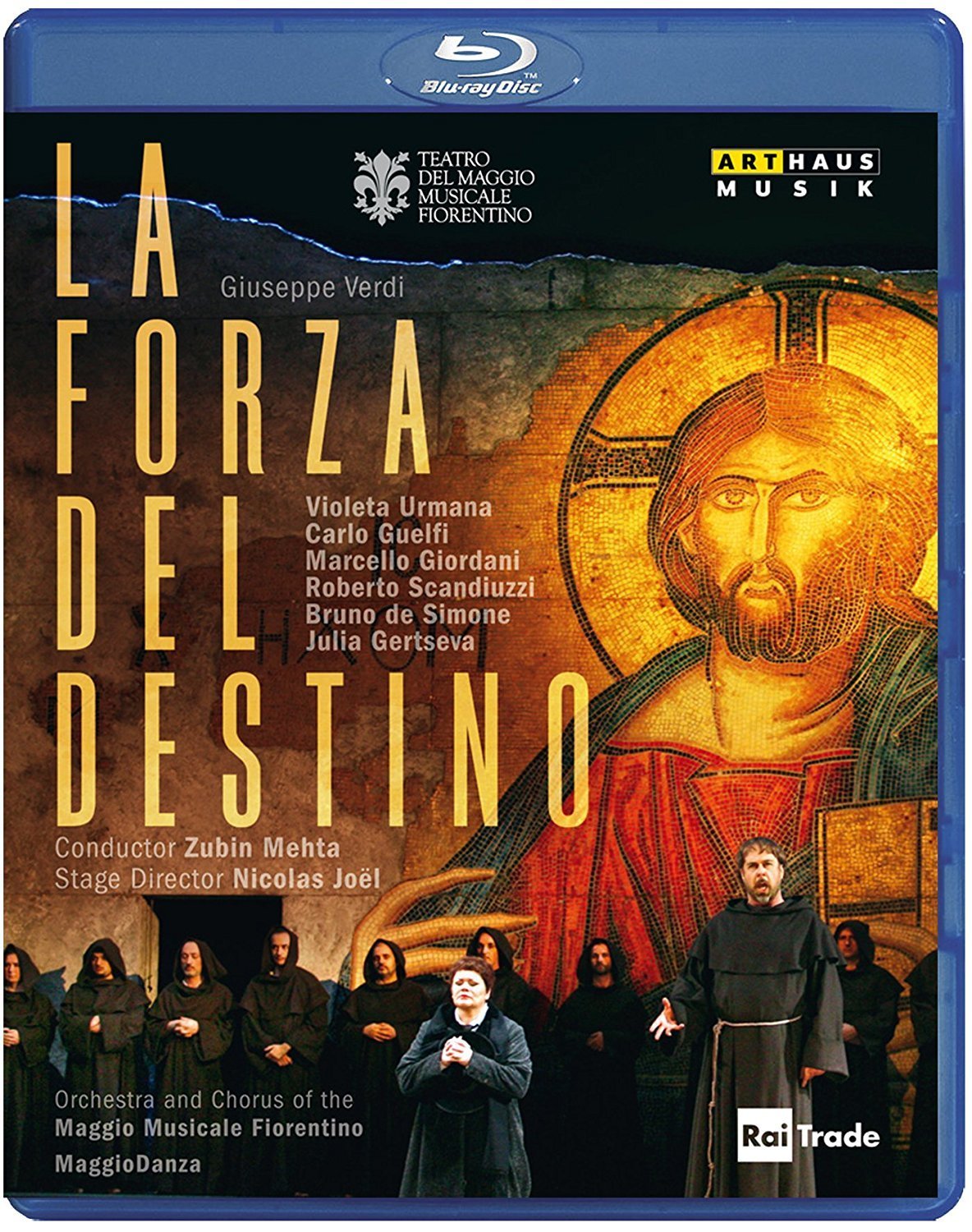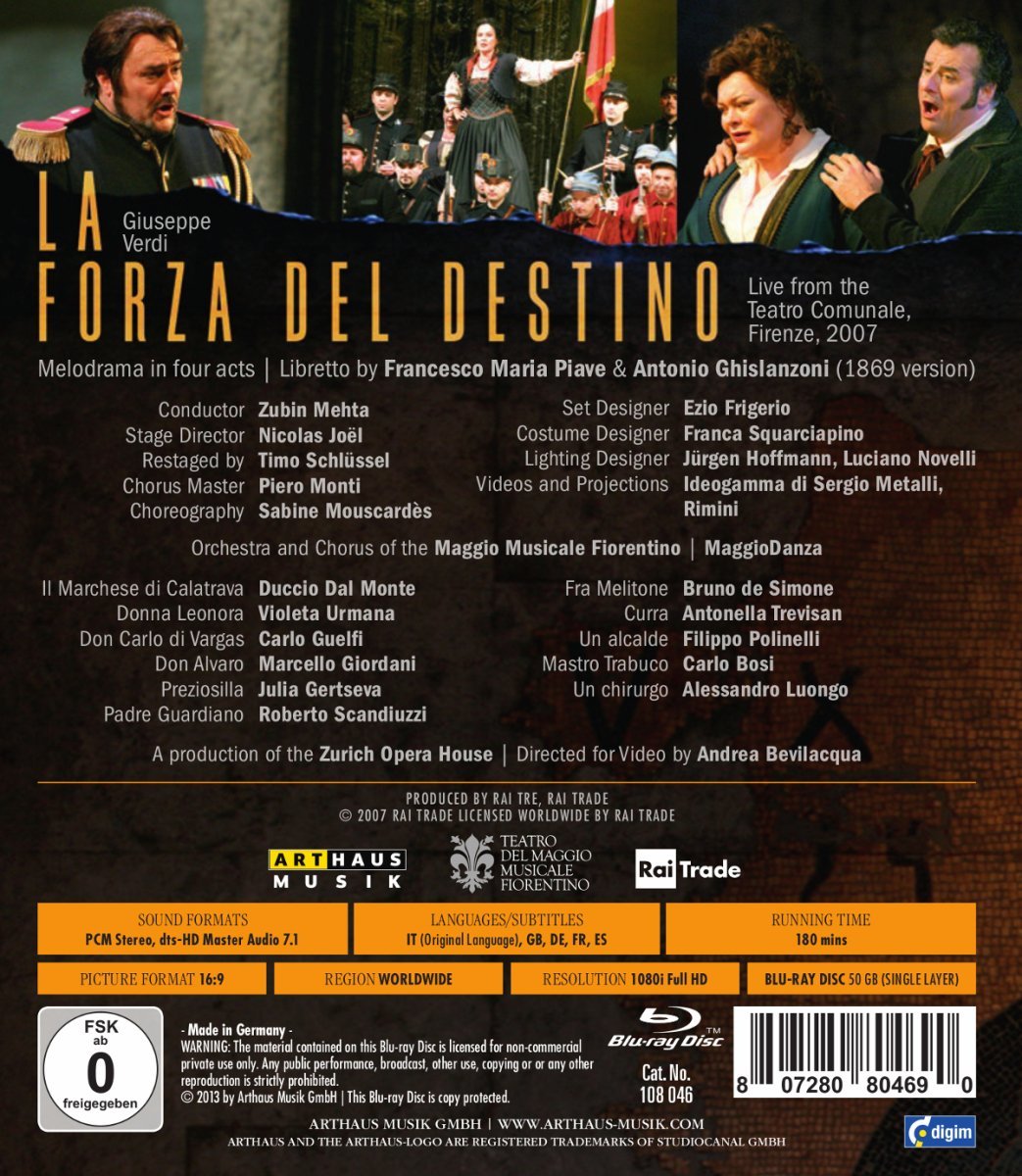

Verdi La forza del destino opera to libretto by Francesco Piave. Directed 2007 by Nicolas Joël at Teatro del Maggio Musicale in Florence. Stars Violeta Urmana (Donna Leonora), Carlo Guelfi (Don Carlo di Vargas), Marcello Giordani (Don Alvaro), Duccio Dal Monte (Il Marchese di Calatrava), Julia Gertseva (Preziosilla), Roberto Scandiuzzi (Padre Guardiano), Bruno De Simone (Fra Melitone), Antonella Trevisan (Curra), Filippo Polinelli (Un alcalde), Carlo Bosi (Mastro Trabuco), and Alessandro Luongo (Un chirurgo). MaggioDanza choreographed by Sabine Mouscardès. Zubin Mehta conducts the Orchestra and Chorus of Maggio Musicale Fiorentino (Chorus Master Piero Monti). Restaged by Timo Schlüssel; set designs by Ezio Frigerio; costumes by Franca Squarciapino; lighting by Jürgen Hoffman; video projections by Ideogamma di Sergo Metalli, Rimini. Directed for TV by Andrea Bevilacqua. Sung in Italian. Released 2009, disc has 7.1 dts-HD Master Audio sound. Grade: C
Wonk Gordon Smith of OperaDou kindly provided this review:
“People who don't like opera often cite the improbable plots as one of their reasons. Well, Verdi's Force of Destiny is full of improbabilities! It's almost as if putting "Destiny" in the title gives the librettist carte blanc to do just about anything, no matter how ludicrous! Here's just one example: in Act 3 Scene 2 when, after being seriously wounded in battle, Don Alvaro believes he is on the verge of death. He gives his greatest friend, Don Carlo, a valise containing a bundle of letters which Don Carlo is to destroy as soon as Don Alvaro dies. Don Carlo has sworn not to look at the contents of the letters, but becomes suspicious of his friend. He opens the valise, finds Don Carlo's sister's picture, and realizes that Don Alvaro must be Don Carlo's sister's fiancee who "accidentally" shot Don Carlo's father to death and then disappeared (while the sister ran away and became a hermit). Ever since that day Don Carlo has vowed to find both his sister and her lover and kill them. He curses the fact that Don Alvoro is now about to die of his wounds, depriving him of revenge. At which moment, Destiny plays its card yet again, and in comes a surgeon to announce that, cheer up, Don Alvaro will make a perfect recovery. (This gets a snickering laugh from the audience in the Florentine Opera House!). Don Alvaro reappears about five minutes later, sufficiently fit to fight a duel with his enemy turned friend and now enemy again.
Nicolas Joël's production does nothing to temper this or other jaw-dropping "twists of fate" in the story. The hammy plot is presented in a very traditional and at times overly static manner. All this crowds out the excellent music (it is Verdi after all) and the overall high level of performance. In particular, Violeta Urmana, the heroine Leonora, has an amazingly powerful voice and does more than justice to her role. (She also manages to retain her generous proportions after living as a hermit in a grotto for 10 years on just one loaf of rancid bread a week.)
Maybe it's time someone updated "The Force of Destiny" to the First World War or something. In any case, for me, this production deserves no more than a grudging grade of C.”
So there are three big problems with this production. First, as Gordon neatly points out, it’s not fashionable now to accept wholesale plot goofiness for melodramatic effect. Second, this production is very traditional, outdated, and musty. Finally, there is a martial theme which peaks at the end of Act 3 with the "Rataplan" military chorus. Was Verdi condemning militarism or expressing Italian patriotism? We find this production militaristic and distasteful, but you might interpret this differently.
Still, two observations made by Verdi in the opera remain clearly valid. The first is Verdi's contrast between the mad arrogance of the aristocrats and the pitiful condition of the people whom the aristocrats exploit. Second is Verdi's condemnation of the Calatrava curse, which brings total destruction to his family while sparing Alvaro.
So the libretto of La Forza is weak and confusing. But it’s coupled with some of Verdi’s finest arias, duets, chorus work, and orchestration. Maybe other directors will be able to successfully update this problematical opera in Blu-ray. For this disc, we will stick with Gordon’s C grade.